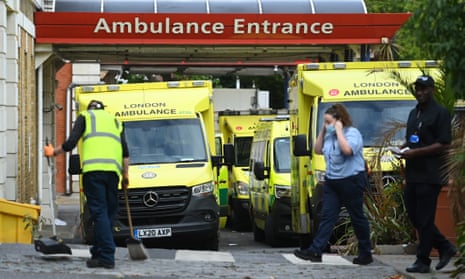More than 30,000 heart patients in England have died needlessly since the start of the Covid-19 pandemic, amid continuing ambulance delays, inaccessible care and soaring waiting lists, a report says.
The British Heart Foundation (BHF) said significant and widespread disruption to heart care services was still driving a surge in excess deaths.
Its analysis of official data reveals that there have been, on average, more than 230 extra deaths a week over and above what would be expected for heart disease since the start of the pandemic. Since the arrival of Covid there have been just over 30,000 excess deaths linked to heart disease.
Dr Sonya Babu-Narayan, an associate medical director at the BHF, said: “Far too many people continue to face long waits for time-sensitive heart care, putting them at higher risk of becoming more unwell the longer they wait, with potentially devastating consequences.
“Delays on such an extreme scale are likely leading to avoidable emergency admissions, permanent heart damage, disability from heart failure, and early death. There aren’t enough NHS staff to deal with the ever-rising tide of heart problems, and those that remain are overstretched, overwhelmed and close to leaving.”
NHS figures show that ambulances in England took an average of 47 minutes and 59 seconds in September to respond to emergency calls such as for suspected heart attacks. This was up from 42 minutes and 44 seconds in August, and was well above the target of 18 minutes.
There are also still issues with ambulances waiting outside hospitals owing to delays in being able to hand patients over to A&E.
The BHF report describes a “vast backlog of time-sensitive cardiac care”, which has jumped by almost 50% since the pandemic began to nearly 350,000 people.
It warns of millions of “missing” heart patients, diagnosed and undiagnosed, who could have conditions such as high blood pressure that put them at higher risk of heart attack and stroke.
Dr Charmaine Griffiths, the chief executive of the BHF, said: “It is devastating that the ongoing and extreme disruption to heart care has meant that 30,000 more families have lost a loved one. Today, many hundreds of thousands of people fear that their heart condition could get worse before they get treatment, potentially stopping them from working or enjoying a full life.
“Many more are completely unaware they now have a condition putting them at a greater risk of early death from a heart attack or stroke. There isn’t a moment to lose, the urgent needs of heart patients and NHS staff must be heard. As this new government draws up its priorities for healthcare, a heart strategy must be at the top of the agenda to prevent more heartbreak and needless loss of life.”
A separate report also published on Thursday shows that Asian people in England experienced a much larger fall in planned hospital care during the pandemic than white, black or mixed ethnic groups.
According to the research, large variations in rates of hospital care in England for different ethnic groups existed prior to 2020, but the 3.7m drop in planned hospital procedures over the pandemic’s first two years worsened those disparities.
after newsletter promotion
The research by the Nuffield Trust and the NHS Race and Health Observatory provides the most detailed statistical analysis of the English hospital care backlog by ethnic group to date.
Sarah Scobie, the Nuffield Trust’s deputy director of research, said: “Urgent action now needs to be undertaken to address healthcare inequalities between ethnic and socioeconomic groups and to address the large and sustained deficit in cardiac care for the Asian group.”
Dr Habib Naqvi, the director of the NHS Race and Health Observatory, said: “The government should uphold the pledge to ‘deliver on the NHS’ by tackling the backlog as a priority.”
An NHS England spokesperson said: “While Covid has inevitably had an impact with fewer people coming forward for care, there has been a significant increase in referrals for cardiac care over the last year and staff are already making significant progress on the longest waiters – many of whom are cardiac patients – with the number of people waiting more than 18 months 60% lower in August compared to the same month last year.
“Our national elective recovery plan set out a comprehensive blueprint for tackling backlogs and local teams are working hard to restore their cardiac services to pre-pandemic levels while maintaining a focus on preventing heart disease in the first place, so if you are worried about symptoms please come forward for care.”
